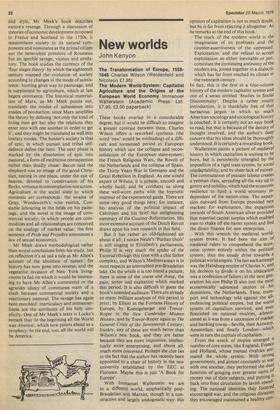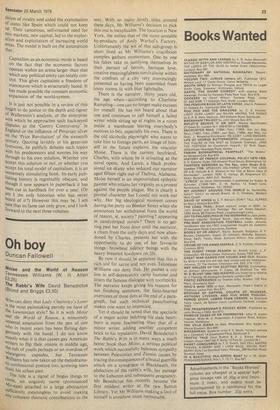New worlds
John Kenyon
The Transformation of Europe, 15581648 Charles Wilson (Weidenfeld and Nicolson E7.95) The Modern World-System: Capitalist Agriculture and the Origins of the European World Economy Immanuel Wallerstein (Academic Press Ltd. £7.90, £3.00 paperback) These books overlap to a considerable degree, but it would be difficult to imagine a greater contrast between them. Charles Wilson offers a reworked synthesis (the word 'new' would be misleading) of a difficult and tormented period in European history which saw the collapse and reconsolidation of the European state-system; the French Religious Wars, the Revolt of the Netherlands and the collapse of Spain, the Thirty Years War in Germany and the Great Rebellion in England. As one would expect of Wilson, it is urbane, smooth and wholly lucid, and he conducts us along these well-worn paths with the hypnotic murmur of the experienced guide. There are some very good things here; for instance, his analysis of the political impact of Calvinism and his brief but enlightening summary of the Counter-Reformation. His more extensive account of the Dutch Revolt draws upon his own research in this field.
But it has rather an old-fashioned air about it all; I notice Neale's 'Puritan choir' is still singing in Elizabeth's parliaments, Philip II is very much the spider of the Escorial (though this time with a chic father complex), and Wilson's Mediterranean is in most respects an untroubled pre-Braudelian lake. On the whole it is too bland a picture; there is none of the sturm und drang, the pain, terror and exaltation which marked this period. It is also difficult to guess the book's intended audience. There are already so many brilliant analyses of this period in print; by Elliott in the Fontana History of Europe, by Koenigsberger and TrevorRoper in the New Cambridge Modern History, and by Trevor-Roper again in The General Crisis of the Seventeenth Century; frankly, any of these are much better than Wilson's new book, and they are better because they are more inquisitive, intellectually more enterprising, and above all, much more concerned. Perhaps the clue lies in the fact that the author has recently been appointed to a chair of history in the new university established by the EEC at Florence. Maybe this is just `A Book for Europe'.
With Immanuel Wallerstein we are in a different world, emphatically postBraudelian and Marxist, though in a constructive and largely undogmatic way. His
opinion of capitalism is not in much doubt, but he is far from rejecting it altogether. As he remarks at the end of this book : The mark of the modern world is the imagination of its profiteers and the counter-assertiveness of the oppressed. Exploitation, and the refusal to accept exploitation as either inevitable or just, constitute the continuing antinomy of the modern era, joined together in a dialectic which has far from reached its climax in the twentieth century.
In fact, this is the first in a four-volume history of the modern capitalist system and one of a series entitled 'Studies in Social Discontinuity'. Despite a rather muzzY introduction, it is thankfully free of that barbarous jargon in which so much American sociology and sociological historY is couched; it is certainly not an easy book to read, but that is because of the density of thought involved, and the author's deep concern that his ideas should be thoroughlY understood. It is certainly a rewarding book.
Wallerstein paints a picture of medieval history in which capitalism is waiting to be born, but is persistently strangled by the imposition of a rigid state system, by social unadaptability, and by sheer lack of money. The commutation of peasant labour creates a yeoman class, spreading all the way up to gentry and nobility, which had the economic resilience to fund a world economy independent of the nation-state. The expansion outward from Europe provided new markets for exploitation, the expansion inwards of South American silver provided that essential capital surplus which enabled men to shake off the barter system and find the direct finance for new enterprises.
With this wrench the medieval world system broke. It had been the aim of medieval rulers to comprehend the economic system entirely within the political system; thus the steady drive towards a political world empire. The last such attemPt was the Habsburg empire of Charles V, and his decision to divide it on his abdication was a confession of failure; in the next generation his son Philip II also lost the most economically advanced section of his dominions, the Netherlands. Time, transport and technology told against the allembracing political empire, but the world system of capitalism survived, and even flourished on national rivalries, administered as it was from a succession of market and banking towns—Seville, then Antwerp, Amsterdam and finally London—which were in turn the capitals of capitalism. From the wreck of empire emerged a number of core states, like England, France and Holland, whose mutual rivalries animated the whole system. With strong governments, and almost constantly at war with one another, they performed the duafl function of gouging ever greater sums o money out of their subjects, and putting it back into freer circulation by lavish spending. The national identities they fostered encouraged war, and the religious divisions they encouraged maintained a healthy con
dition of rivalry and aided the exploitation of states like Spain which could not keep UP. Their cancerous, self-created need for new markets, new capital, led to the exploration and exploitation of increasing world areas. The model is built on the assumption that : Capitalism as an economic mode is based on the fact that the economic factors operate within an arena larger than that Which any political entity can totally control. This gives capitalists a freedom of manoeuvre which is structurally based. It has made possible the constant economic expansion of the world-system.
It is just not possible in a review of this length to do justice to the depth and rigour of Wallerstein's analysis, or the enterprise with which he approaches such hackneyed disputes as the 'Gentry Controversy' in England or the influence of Peruvian silver on the 'Price Revolution' of the sixteenth century. Quoting lavishly in his generous footnotes, he publicly debates such topics with his predecessors and worries his way through to his own solution. Whether you accept this solution or not, or whether you accept his total model of capitalism, it is an inimensely stimulating book. Its early publishing history is regrettably obscure, and though it now appears in paperback it has been out in hardback for over a year. (Or am I the only historian who has never heard of it ?) However this may be, I am sure that its fame can only grow, and I look forward to the next three volumes.



































 Previous page
Previous page